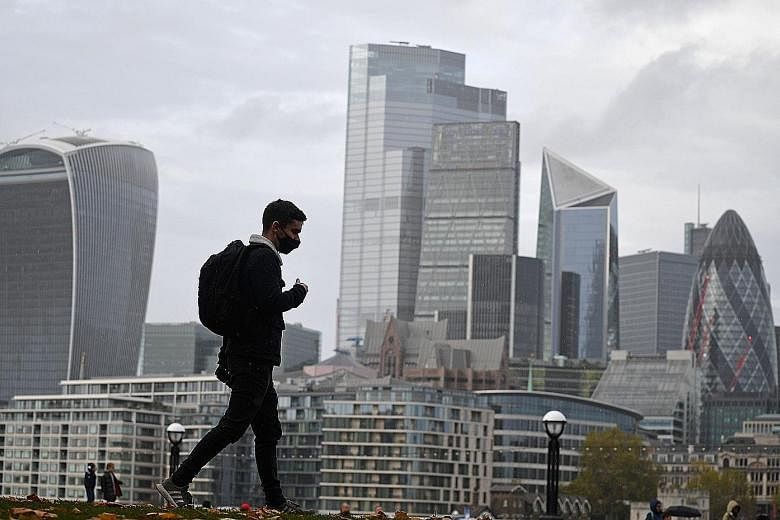LONDON • Britain's coronavirus-ravaged economy suffered its biggest crash in output in more than 300 years when it slumped by 9.9 per cent last year, but it avoided heading back towards a recession at the end of the year and looks on course for a recovery in 2021.
Official figures on Friday showed gross domestic product (GDP) grew 1 per cent from October to December, the top of a range of economists' forecasts in a Reuters poll.
This makes it likely that Britain will escape two straight quarters of contraction - the standard definition of recession in Europe - even though the economy is set to shrink early this year due to the effects of a third Covid-19 lockdown.
"As and when restrictions are eased, we continue to expect a vigorous rebound in the economy," said UBS Global Wealth Management economist Dean Turner.
The British economy grew 1.2 per cent in December alone, after a 2.3 per cent fall in output in November when there was a partial lockdown, pointing to greater resilience to Covid-19 restrictions than at the start of the pandemic.
That left output 6.3 per cent lower than in February before the start of the pandemic, the Office for National Statistics said.
However, the Bank of England has forecast that the economy will shrink by 4 per cent in the first three months of this year because of the new lockdown and disruption due to Brexit. It thinks it will take until early next year before GDP regains its pre-Covid-19 size, assuming vaccination continues at the current rapid pace. Many economists, however, think recovery will take longer.
"Today's figures show that the economy has experienced a serious shock as a result of the pandemic, which has been felt by countries around the world," said Finance Minister Rishi Sunak.
Mr Sunak, facing the heaviest borrowing since World War II, said he would continue to focus on protecting jobs when he sets out a new annual budget on March 3.
Unemployment has risen much less than feared at the start of the crisis, largely due to subsidies to keep people in work, though sectors such as hospitality and high-street retail remain hard hit.
Last year's fall in output was the biggest since modern official records began after World War II. Longer-running historical data hosted by the Bank of England suggests it was the biggest drop since 1709, when Britain suffered a "Great Frost".
Britain has reported Europe's highest death toll from Covid-19 and is among the world's highest in terms of deaths per head.
While the fall in British GDP is steeper than almost any other big economy's, Spain - also hard-hit by the virus - suffered an 11 per cent decline.
REUTERS

